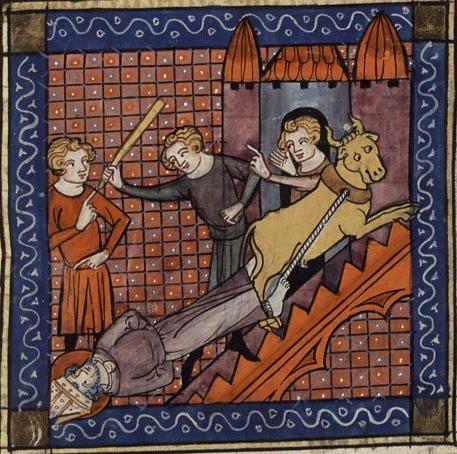Wednesday of week 34 in Ordinary Time  basilica Saint-Sernin of Toulouse Readings at MassLiturgical Colour: Green. Year: A(I).
The writing on the wallKing Belshazzar gave a great banquet for his noblemen; a thousand of them attended, and he drank wine in company with this thousand. As he sipped his wine, Belshazzar gave orders for the gold and silver vessels to be brought which his father Nebuchadnezzar had looted from the sanctuary in Jerusalem, so that the king, his noblemen, his wives and his singing women could drink out of them. The gold and silver vessels looted from the sanctuary of the Temple of God in Jerusalem were brought in, and the king, his noblemen, his wives and his singing women drank out of them. They drank their wine and praised their gods of gold and silver, of bronze and iron, of wood and stone. Suddenly the fingers of a human hand appeared, and began to write on the plaster of the palace wall, directly behind the lamp-stand; and the king could see the hand as it wrote. The king turned pale with alarm: his thigh-joints went slack and his knees began to knock. Daniel was brought into the king’s presence; the king said to Daniel, ‘Are you the Daniel who was one of the Judaean exiles brought by my father the king from Judah? I am told that the spirit of God Most Holy lives in you, and that you are known for your perception, intelligence and marvellous wisdom. As I am told that you are able to give interpretations and to unravel difficult problems, if you can read the writing and tell me what it means, you shall be dressed in purple, and have a chain of gold put round your neck, and be third in rank in the kingdom.’ Then Daniel spoke up in the presence of the king. ‘Keep your gifts for yourself,’ he said ‘and give your rewards to others. I will read the writing to the king without them, and tell him what it means. You have defied the Lord of heaven, you have had the vessels from his Temple brought to you, and you, your noblemen, your wives and your singing women have drunk your wine out of them. You have praised gods of gold and silver, of bronze and iron, of wood and stone, which cannot either see, hear or understand; but you have given no glory to the God who holds your breath and all your fortunes in his hands. That is why he has sent the hand which, by itself, has written these words. The writing reads: Mene, Mene, Tekel and Parsin. The meaning of the words is this: Mene: God has measured your sovereignty and put an end to it; Tekel: you have been weighed in the balance and found wanting; Parsin: your kingdom has been divided and given to the Medes and the Persians.’
Sun and moon! bless the Lord. Give glory and eternal praise to him! Stars of heaven! bless the Lord. Give glory and eternal praise to him! Showers and dews! all bless the Lord. Give glory and eternal praise to him! Winds! all bless the Lord. Give glory and eternal praise to him! Fire and heat! bless the Lord. Give glory and eternal praise to him! Cold and heat! bless the Lord. Give glory and eternal praise to him!
Alleluia, alleluia! Stay awake, praying at all times for the strength to stand with confidence before the Son of Man. Alleluia!
Alleluia, alleluia! Even if you have to die, says the Lord, keep faithful, and I will give you the crown of life. Alleluia!
Your endurance will win you your livesJesus said to his disciples: ‘Men will seize you and persecute you; they will hand you over to the synagogues and to imprisonment, and bring you before kings and governors because of my name – and that will be your opportunity to bear witness. Keep this carefully in mind: you are not to prepare your defence, because I myself shall give you an eloquence and a wisdom that none of your opponents will be able to resist or contradict. You will be betrayed even by parents and brothers, relations and friends; and some of you will be put to death. You will be hated by all men on account of my name, but not a hair of your head will be lost. Your endurance will win you your lives.’ Christian Art Each day, The Christian Art website gives a picture and reflection on the Gospel of the day. The readings on this page are from the Jerusalem Bible, which is used at Mass in most of the English-speaking world. The New American Bible readings, which are used at Mass in the United States, are available in the Universalis apps, programs and downloads. |



